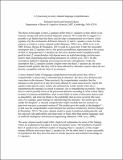L2 processing as noisy channel language comprehension
Author(s)
Futrell, Richard Landy Jones; Gibson, Edward A
DownloadGibson3.pdf (81.91Kb)
OPEN_ACCESS_POLICY
Open Access Policy
Creative Commons Attribution-Noncommercial-Share Alike
Terms of use
Metadata
Show full item recordAbstract
The thesis in this paper is that L2 speakers differ from L1 speakers in their ability to do memory storage and retrieval about linguistic structure. We would like to suggest it is possible to go farther than this thesis and develop a computational-level theory which explains why this mechanistic difference between L2 and L1 speakers exists. For this purpose, we believe a noisy channel model (Shannon, 1948; Levy, 2008; Levy, Bicknell, Slattery & Rayner, 2009; Gibson, Bergen & Piantadosi, 2013) could be a good start. Under the reasonable assumption that L2 speakers have a less precise probabilistic representation of the syntax of their L2 language than L1 speakers do, the noisy channel model straightforwardly predicts that L2 comprehenders will depend more on world knowledge and discourse factors when interpreting and recalling utterances (cf. Gibson, Sandberg, Fedorenko, Bergen & Kiran, 2015, for this assumption applied to language processing for persons with aphasia). Also, under the assumption that L2 speakers assume a higher error rate than L1 speakers do, the noisy channel model predicts that they will be more affected by alternative parses which are not directly compatible with the form of an utterance.
Date issued
2016-09Department
Massachusetts Institute of Technology. Department of Brain and Cognitive SciencesJournal
Bilingualism: Language and Cognition
Publisher
Cambridge University Press
Citation
Futrell, Richard, and Gibson, Edward. “L2 Processing as Noisy Channel Language Comprehension.” Bilingualism: Language and Cognition 20, 4 (September 2016): 683–684 © 2016 Cambridge University Press
Version: Author's final manuscript
ISSN
1366-7289
1469-1841